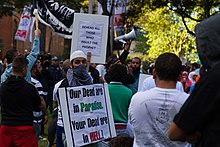Neofundamentalism (Islam)
Neo-fundamentalism is a name for a branch of Islamism that wants to enforce Sharia law in society.
The term was coined by the French political scientist Olivier Roy (* 1949). Roy sees a trend towards neo-fundamentalism in the various Islamist movements. While conventional Islamism wanted to bring about a political revolution in order to establish an Islamic state (based on the model of Iran, for example ), neo-fundamentalists primarily strive to change the social, cultural and societal framework .
Reasons for the emergence of neo-fundamentalism
After the Islamic revolution in Iran was unsuccessful as a model for an Islamic state in the Sunni world , Olivier Roy stated for the 1980s that political Islam was gradually giving up its main goal, the establishment of the Islamic state. One reason for this is the futility of both terrorist and revolutionary attempts to change the Islamic world in such a way. The strict morals preached by neo-fundamentalism were attractive. In addition, Wahhabism , which is influenced by Saudi Arabia, favors a strictly conservative current and funds corresponding projects. A supporting organization for this is the Muslim World League .
Characteristics of neo-fundamentalism
The most important characteristic of neo-fundamentalism is that Islamization should take place from below as opposed to state Islamization from above. This is done by the fact that Islamic behavior should move into everyday life, especially with regard to moral concepts and ritual regulations. This is characterized by the prohibition of alcohol , pornography , gambling , drugs , music , dance , cinemas and cafés . Instead, Puritan Islamized zones are created. Examples are the FIS in Algeria , Asyut in Egypt , Tajikistan , Erzurum in Turkey , the Taliban in Afghanistan and also some Muslim immigrants in the UK .
Another important point is the role of women . While in political Islam, for example in Iran , women take an active part in public life as long as they are veiled, neo-fundamentalism prohibits women from working independently, the right to vote and co-education during school-age training, and requires them to be at home to stay.
Further differences to political Islamism
While conventional Islamists try to build a bridge between western modernity and Islam , neo-fundamentalists strictly reject anything western and / or modern. This is particularly evident in their traditional clothing as well as in their hostile attitude towards music and technological achievements. It is therefore not surprising that there are no intellectual masterminds for this trend, as is the case with the Salafism movement. A hallmark of Islamism was the rejection of Sufism and popular Islam , whereas the neo-fundamentalist ideology also appropriated and radicalized these for itself.
bibliography
- Claus Leggewie: Islam in the West: Between Neo-Fundamentalism and Euro-Islam. In: Jörg Bergmann, Alois Hahn and Thomas Luckmann (eds.): Religion and Culture. Opladen 1993. pp. 271-291.
- Kunal Mukherjee: Islamism and neo-fundamentalism. In: Rosemary Durward and Lee Marsden (ed.): Religion, conflict, and military intervention . Farnham: Ashgate 2009, pp. 17-31.
- Sophia Rost: A democratic way out of terrorism in the west: Islamist terrorism, neo-fundamentalism, political publics and global civil society . Berlin: LIT, 2009.
- Olivier Roy : The Islamic Way to the West. Globalization, uprooting and radicalization. Pantheon, Munich 2006, ISBN 3-570-55000-1 .
- Olivier Roy: The Failure of Political Islam. Reprinted edition. Tauris, London et al. 1999, ISBN 1-85043-880-3 .
Web links
- Interview with Olivier Roy: "Complete legal equality for all religions"
- Political science literature on Islamic (neo) fundamentalism in the annotated bibliography of political science
